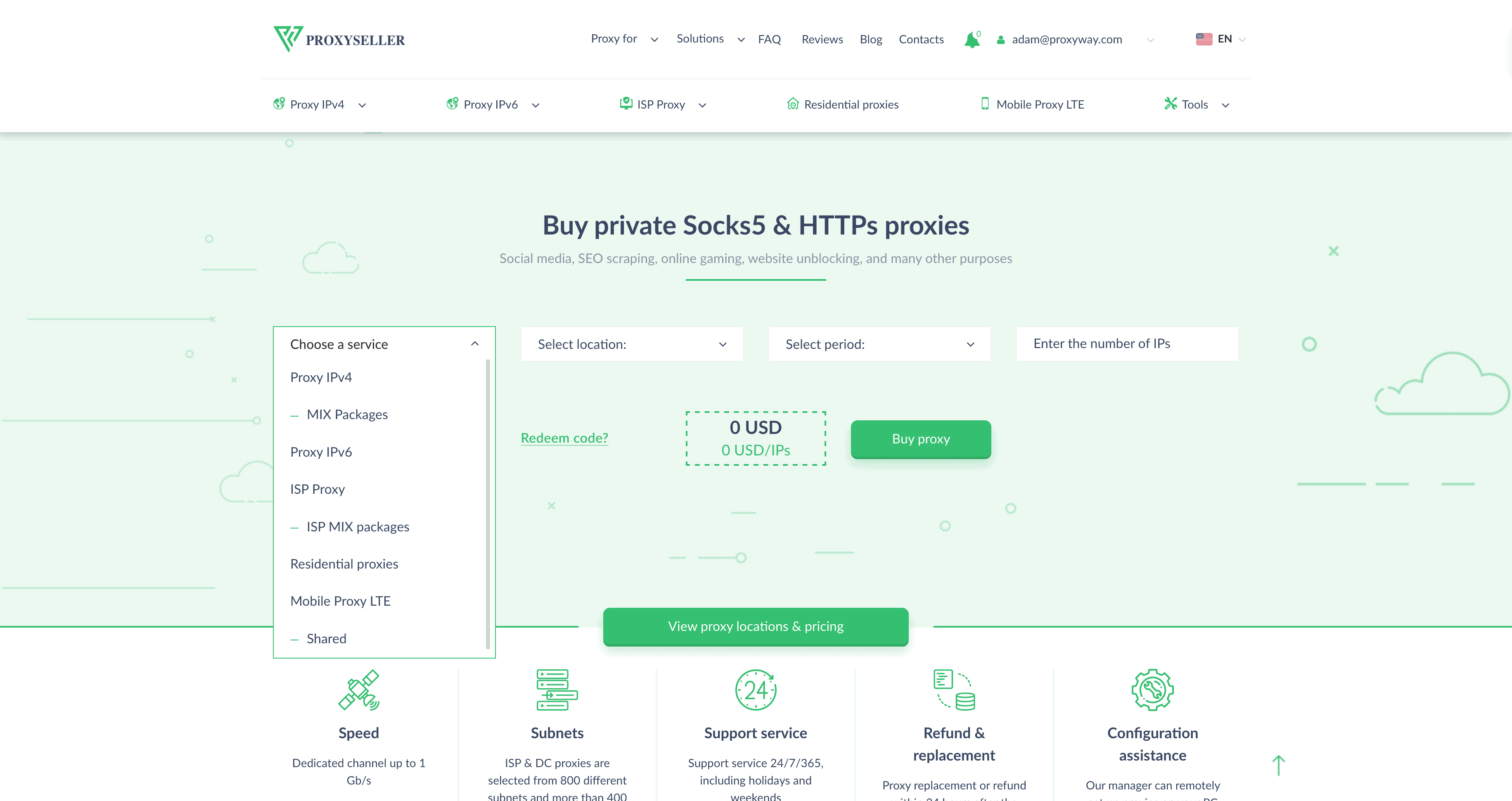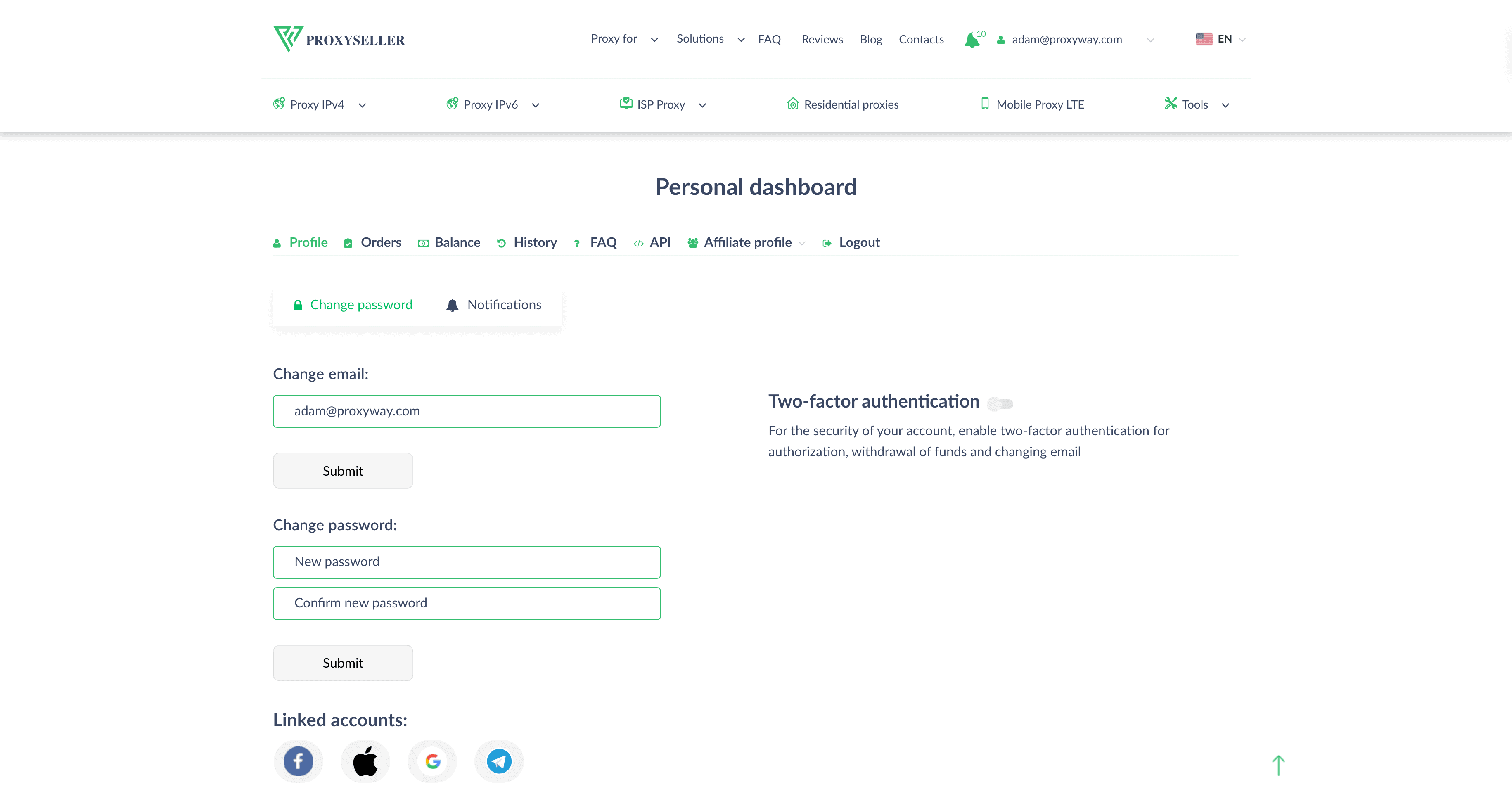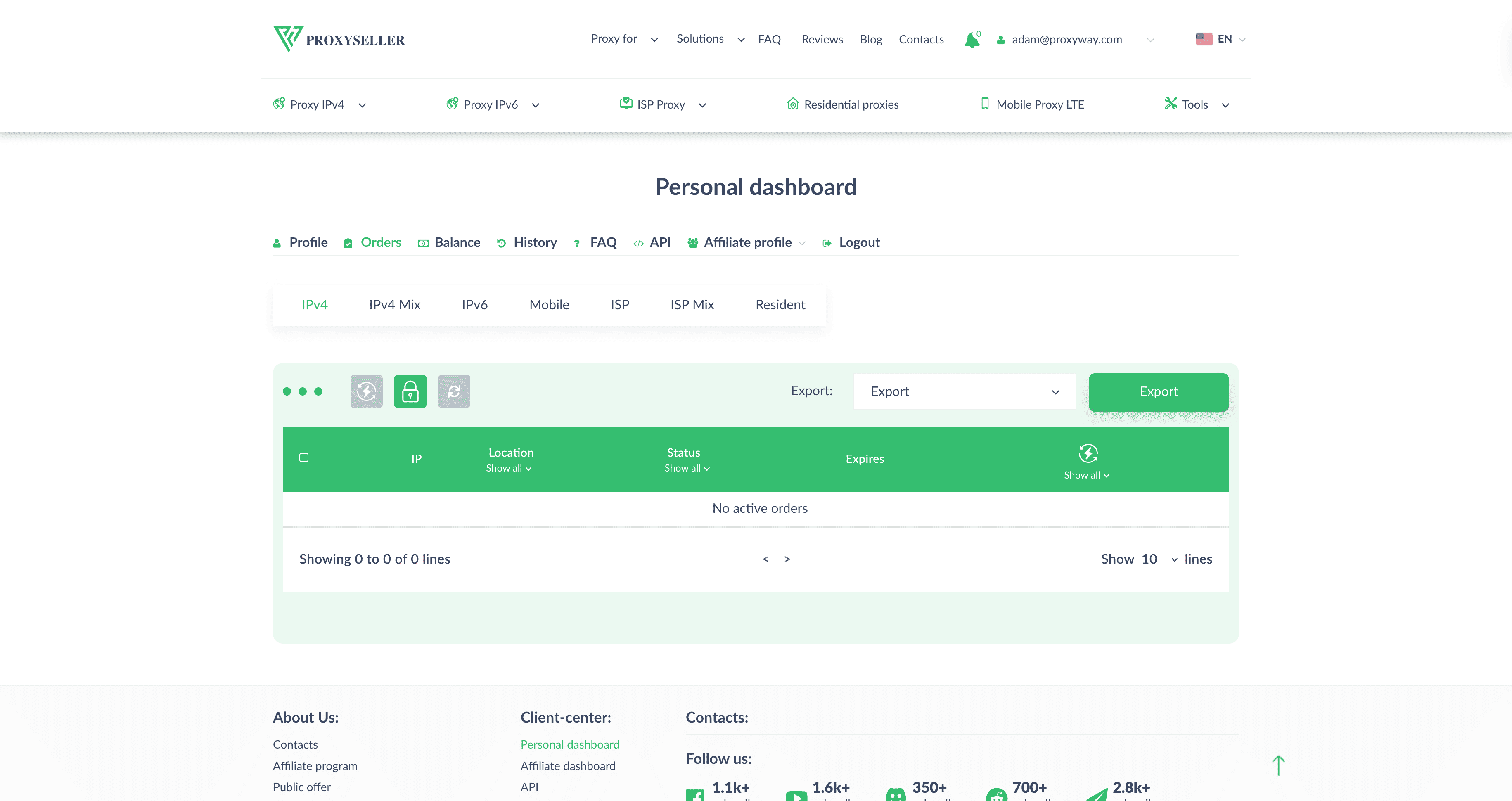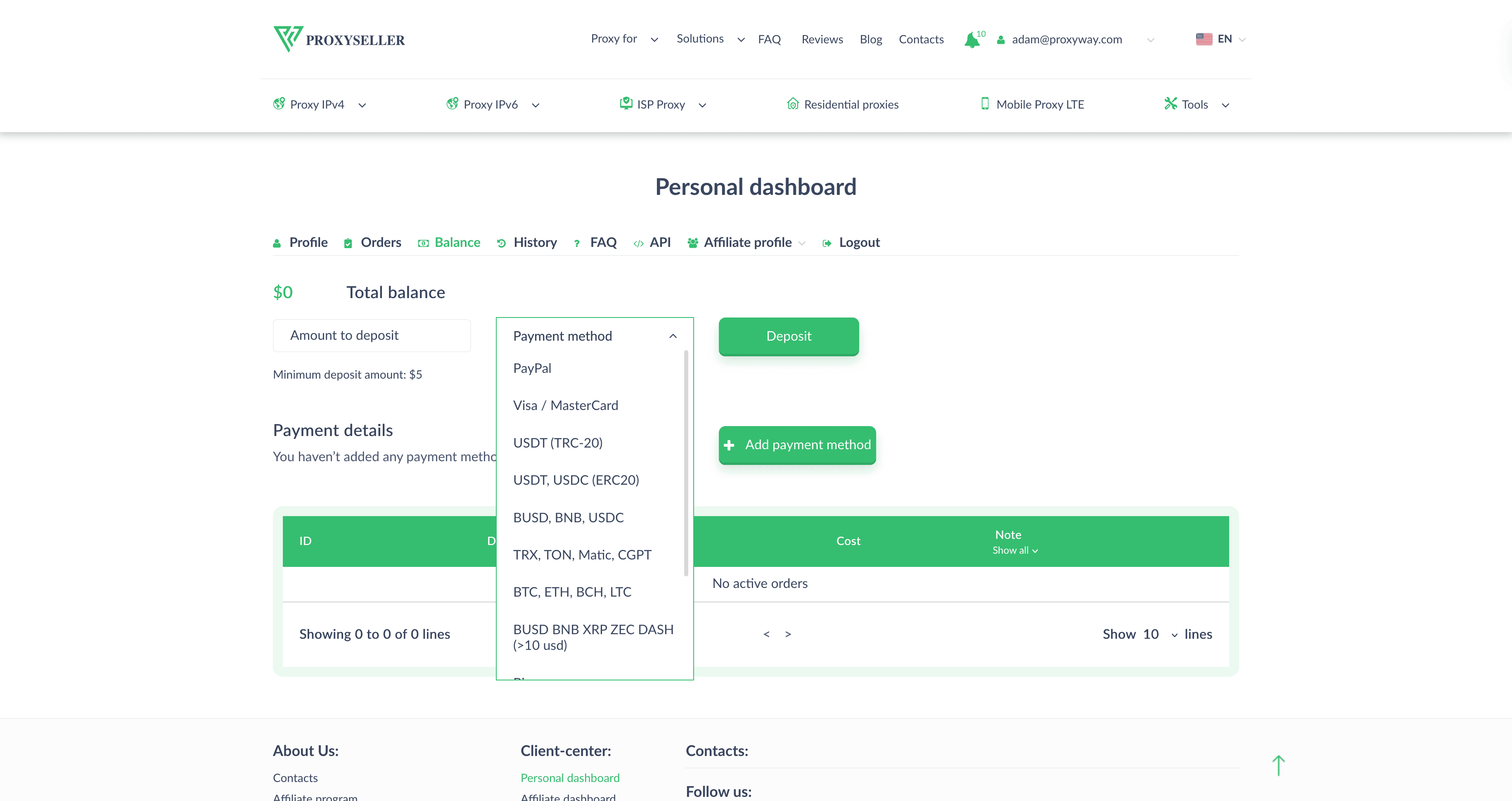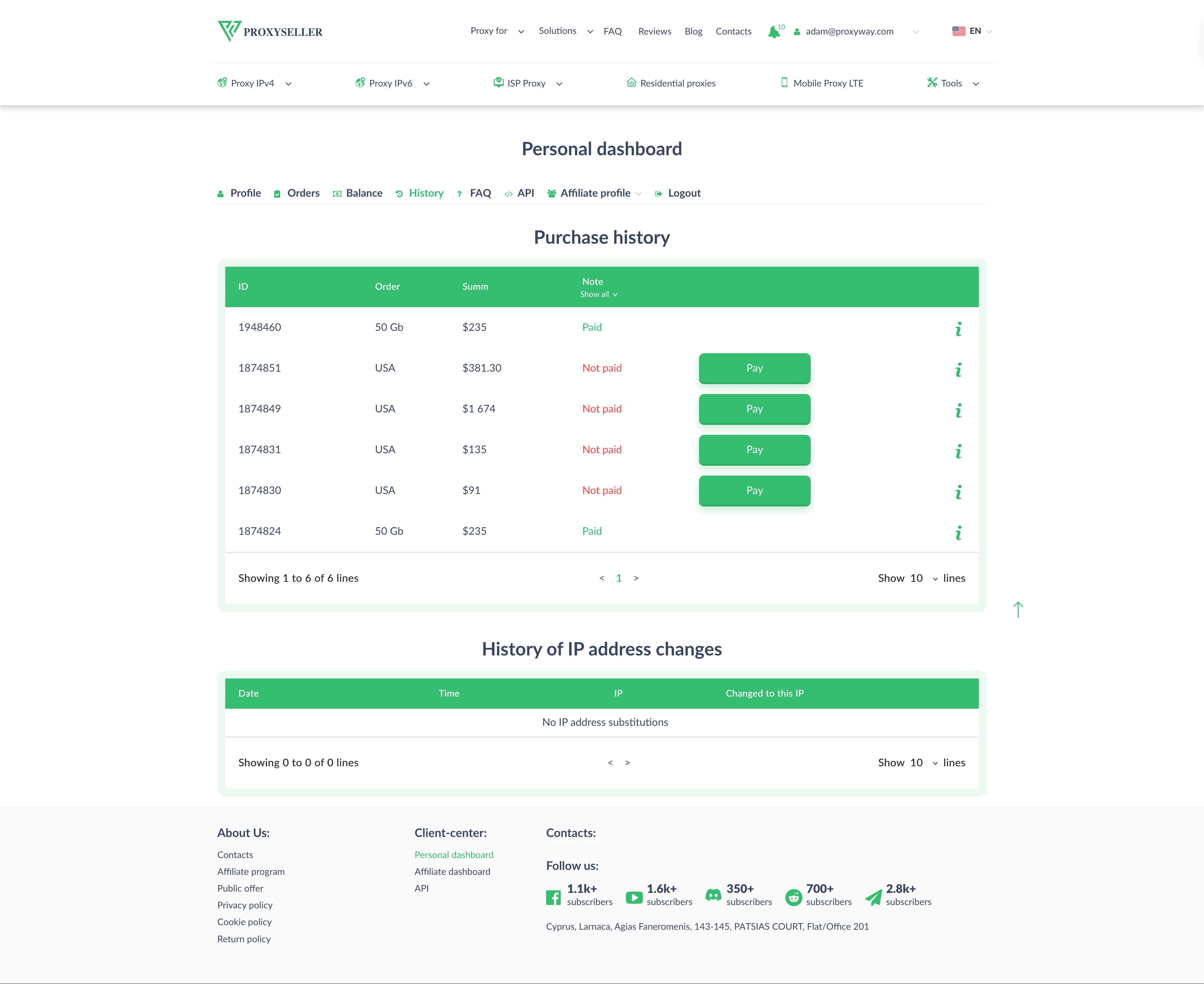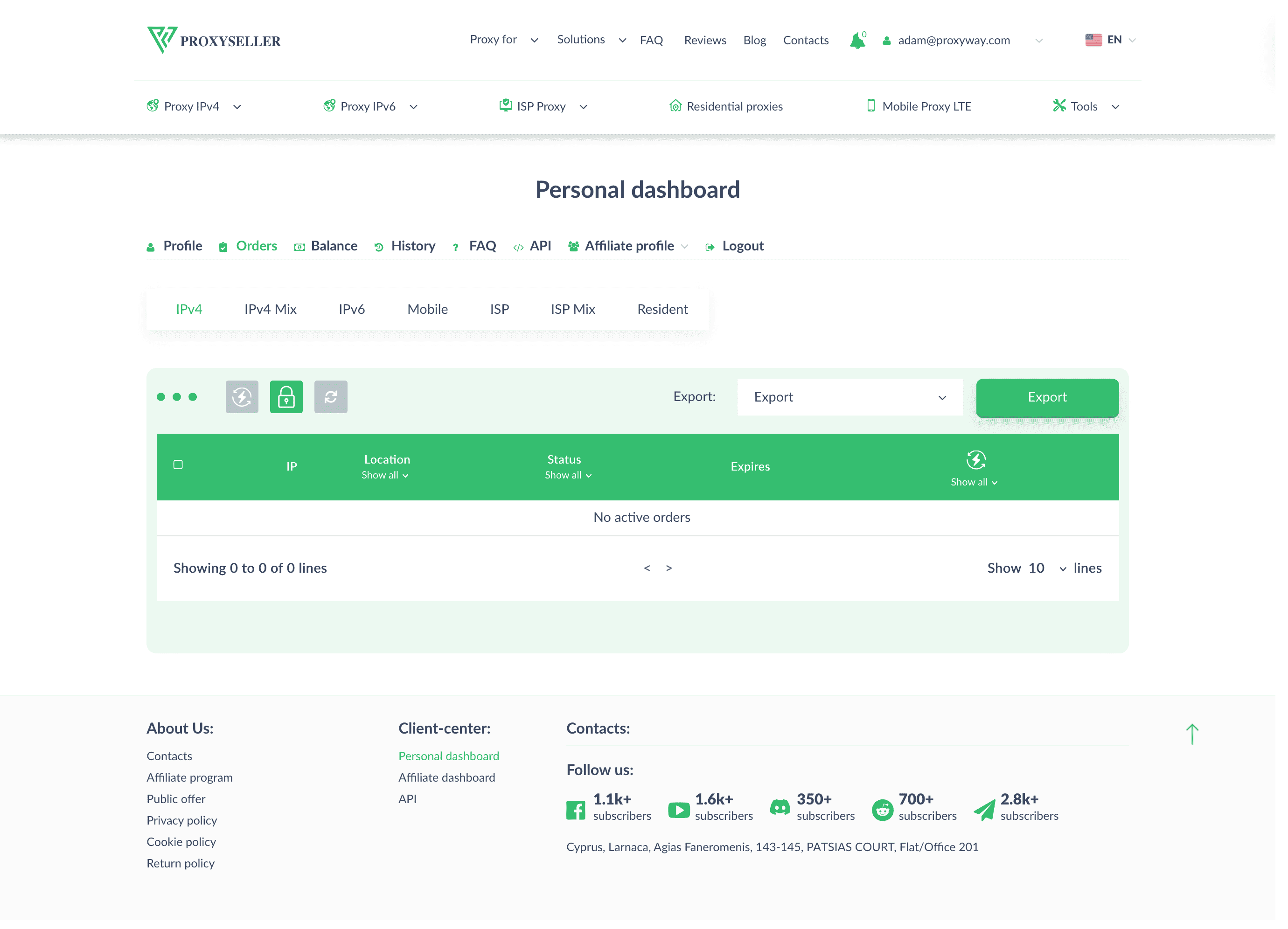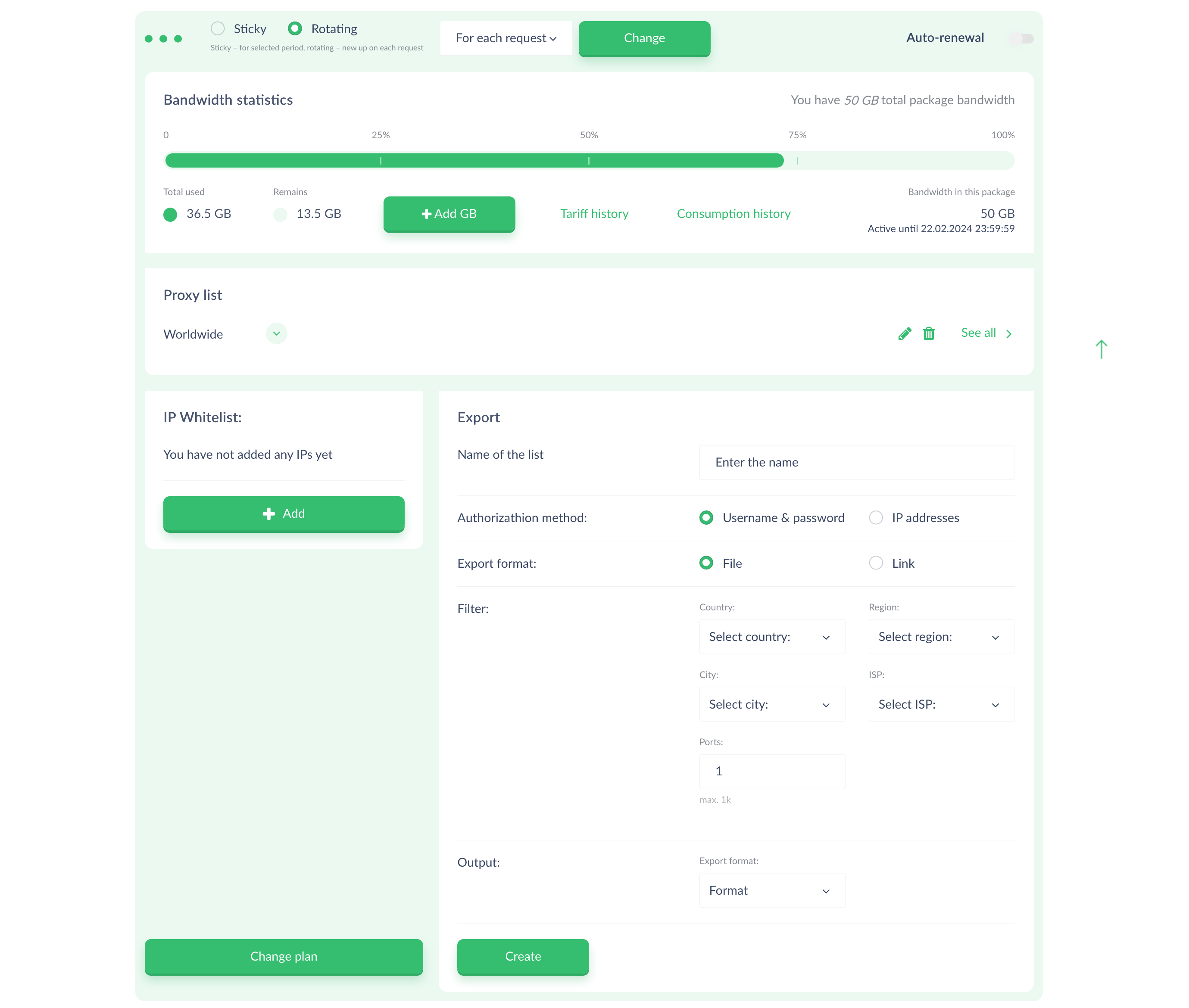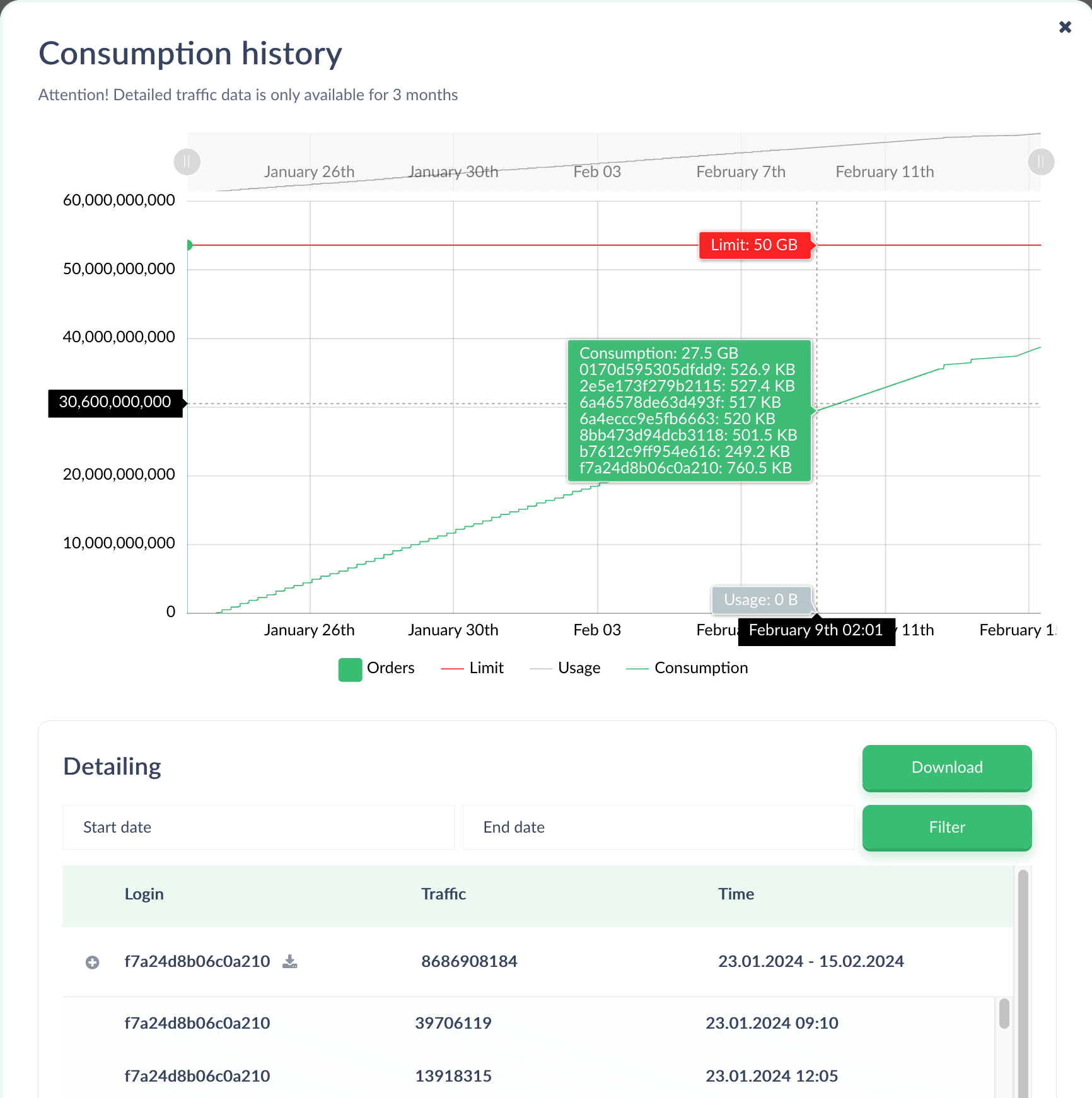
Proxy-Seller Review
Proxy-Seller offers a lot of variety and the option to get as few as 1 IP for an attractive price.
Use the coupon PROXYWAY to get 15% off any purchase and 39% off residential proxies.
Proxy-Seller is known as one of the bigger providers of datacenter proxies (at least in the Eastern European region). Nowadays, it offers all proxy types (including residential IPs) that are accessible to individual users but can also cater to large businesses.
In this review, we’ll take a look at the provider’s proxy networks and see how they compare with the market leaders. Let’s go!
General Information
| Country | Cyprus |
| Founded | 2014 |
| Proxy networks | Datacenter (dedicated, IPv6) ISP (dedicated) Residential Mobile (pay per device) |
| Web scrapers | – |
| Other tools | Proxy checker Do-it-yourself mobile proxies |
| Price range | Mid-range |
| Starting price | $1 |
| Payment methods | Credit card, PayPal, cryptocurrencies |
| Trial | Available for all products |
Proxy-Seller is a Cyprus-based business established in 2014. At the moment, it offers access only to proxy networks. Proxy-Seller can even help you create your own proxy infrastructure by selling mobile dongle kits and the software to make them work.
The provider started off targeting the Eastern European region, which should still be a major focus. But it has since expanded into other markets and can be considered a globally-oriented company.
Proxy-Seller targets a broad audience. Its marketing material (such as pages for video games or survey websites) and a low entry barrier suggest a leaning toward individuals. However, the pricing plans scale to enterprise levels of use.
The provider has a lively presence on social media, communities like Blackhatworld, and a frequently updated YouTube channel. LinkedIn indicates a headcount between 50 and 200 people – likely inflated, but still at a level of a serious provider.
Overall, Proxy-Seller is no spring chicken. I’m not sure how truthful the advertised number of 500,000 customers is, but I wouldn’t be too surprised if that really was the case.
Proxy-Seller Proxy Networks
Proxy-Seller offers four kinds of proxy servers:
- Dedicated datacenter proxies, which are Proxy-Seller’s main product. They come from around 50 locations across five continents and impose very few limitation on how you can use them.
- ISP (static residential) proxies that strongly resemble Proxy-Seller’s datacenter product. The main differences are fewer locations and a higher price in exchange for better effectiveness.
- Residential proxies – a recent addition to Proxy-Seller’s line-up. We don’t know where they come from or if they’re sourced in-house, leading us to assume that the product is resold.
- Mobile proxies – shared or dedicated devices with SIM cards inside them. These proxies aren’t peer-to-peer, and you pay for a device, so they’re best suited for tasks that don’t require many connections at once.

I had the chance to review all four products, with the exception of IPv6 datacenter proxies, which I don’t consider a serious option for now. You can read their detailed descriptions by expanding the sections below.
Datacenter (IPv4)
Coverage
| Countries | Targeting | Distribution |
| Over 50 in five continents | Country (self-service), city (upon request) | One per plan or mixed packages (world, Europe, Asia, etc.) |
Proxy-Seller’s datacenter proxies cover a wide range of locations for this proxy type. It’s possible to get IPs in five continents, with the largest variety being in Europe.
A plan lets you buy IPs in one country. However, you can also choose from one of the mixed packages. For example, Worldwide Mix 1 includes 25% proxies in the US, with the remaining 75% spread throughout all other available countries.
There are at least 10 mixed packages in total, all with different distributions. At this point, it probably would be better to simply let us specify where and how many proxies we need.
Full country list (January 2024)
| Americas | Europe | Asia | Africa | Oceania |
| US, Canada, Mexico, Brazil | Belarus, Belgium, Bulgaria, Cyprus, Czech, Denmark, England, Finland, France, Germany, Greece, Hungary, Ireland, Italy, Latvia, Lithuania, Malta, Netherlands, Norway, Poland, Portugal, Romania, Russia, Serbia, Spain, Sweden, Switzerland, Ukraine | Armenia, Bangladesh, Cambodia, China, Georgia, India, Indonesia, Israel, Japan, Kazakhstan, Malaysia, Singapore, South Korea, Taiwan, Thailand, Turkey, UAE, Vietnam | Nigeria, South Africa | Australia |
Features
| Rotation | Traffic | Concurrency | Protocols | Other |
| Static, every request | Up to unlimited | 500 to thousands of threads | HTTP SOCKS5 | Network priority, custom refresh duration |
These datacenter proxies are pretty much unlimited: they meter neither traffic nor parallel connections. Having said that, Proxy-Seller recommends using no more than three threads per IP, which is low for this proxy type.
You can use multiple connection protocols, and the provider offers an option to replace some or all IPs every month. The proxy list is static – this is expected, though providers like Webshare and Bright Data can offer optional rotation functionality.
Integration & Use
| Connection method | Format | Authentication |
| Direct | IP:Port | Credentials, IP whitelist |
Proxy-Seller offers dedicated datacenter proxies in static lists. These proxies appear in the format of IP:port, which has been the market standard for over a decade.
The SOCKS5 configuration takes a different port. Proxy-Seller’s system is inconvenient in this regard, as it exports the same IP twice with both ports. But this is a minor nuisance.
Pricing Plans
| Model | Format | Modifiers | Starting price | Trial |
| Subscription (week-year) | Pay per IP | Location, subscription duration | From $1.07 for 1 US IP | 24-hour refund |
Proxy-Seller charges per IP address, letting you buy as few as one proxy. The mixed plans, however, start from 50 IPs.
In any case, you’ll be paying for a timed subscription that ranges from a week to a year. Choosing a longer period gives an increasing discount, and one month’s subscription is only twice more expensive than a week’s. That said, past this point the savings diminish.
The price also depends on volume. Naturally, getting more proxies at once will be cheaper per unit. At 750 IPs, the discount reaches 35%, which is significant. Location matters, too: proxies in Indonesia cost over twice more than in the US.
Performance Benchmarks
We last tested Proxy-Seller’s 50 dedicated US proxies in January 2024.
Performance with popular targets
We made ~2,600 connection requests to each target using a non-headless Python scraper. Our computer was located in Germany. We verified results by checking the response code, page size, and title. Note that your results may differ based on your web scraping setup.
Avg. success rate | Avg. response time | |
Amazon | 32.20% | 1.68 s |
Google | 86.84% | 1.04 s |
Homedepot | 74.40% | 1.39 s |
Total | 64.48% | 1.37 s |
The proxies performed okay, with Amazon being an exception. On the other hand, the success rate with Google was high for datacenter IPs.
ISP (Static Residential)
Coverage
| Countries | Targeting | Distribution |
| Over 20 in four continents | Country (self-service), city (upon request) | One per plan or mixed packages (world, Europe, Asia, etc.) |
Proxy-Seller ISP proxies cover fewer locations than the datacenter service. Still, over 20 countries are nothing to scoff at, especially when they’re spread throughout four continents.
Around a half is located in Europe. Other than that, you’ll find the US, Canada, Brazil and major Asian locations like China and India.
A plan lets you choose IPs from one location, but there are also mixed packages that combine several countries in various proportions.
Full country list (March 2024)
| Americas | Europe | Asia | Africa | Oceania | Other |
| US, Canada, Brazil |
Austria, |
China, Hong Kong, India, Israel, Japan, Singapore, South Korea, Taiwan, Thailand, Turkey |
– | – | Mix packages (world, Europe, Asia & more) |
Features
| Rotation | Traffic | Concurrency | Protocols | Other |
| Static | Unlimited | Unlimited threads | HTTP(S), SOCKS5 | Free monthly replacement |
Being dedicated, the ISP proxies never rotate. If you wish, you’re free to replace all or individual IPs once a month free of charge.
The product imposes no traffic or concurrency limitations, and it supports the SOCKS5 protocol. This makes it versatile for all kinds of purposes.
Integration & Use
| Connection method | Format | Authentication |
| Direct | IP:Port | Credentials, IP whitelist |
You get access to a finite list of IPs. They can change after a month, or you can keep extending subscription to all or individual IPs for longer periods of time.
Pricing Plans
| Model | Format | Modifiers | Starting price | Trial |
| Subscription (week-year) | Pay per IP | Location, subscription duration | From $1.5 for 1 US IP | 24-hour refund |
Proxy-Seller uses a subscription model with plans that range from a week to a year. It’s possible to get only one proxy, which is nice if you have minimal needs. At the same time, enterprises can buy 1,000 or more proxy servers at an increasing discount. The mixed plans start from 50 IPs.
In addition to volume and duration, the price also depends on IP location. Some, like England, can be up to 3x expensive as the cheapest countries, such as Ukraine.
Compared to premium providers, the price isn’t high at all, at it scales healthily as you buy more.
Performance Benchmarks
We last tested Proxy-Seller’s 50 dedicated ISP proxies in January 2024. Our IPs were associated with Lumen, a major American ISP, and came from two subsequent subnets.
IP type
We benchmarked the IPs using the IP2Location database to see how many of them were identified as residential addresses (ISP, ISP/MOB, or MOB categories).
| Residential percentage |
| 100% |
All of the IPs were categorized as residential proxies (usage type: ISP), which is a great result.
Performance with popular targets
We made ~2,600 connection requests to each target using a non-headless Python scraper. Our computer was located in Germany. We verified results by checking the response code, page size, and title. Note that your results may differ based on your web scraping setup.
Avg. success rate | Avg. response time | |
Amazon | 73.05% | 2.92 s |
Google | 99.56% | 0.93 s |
Homedepot | 99.97% | 3.50 s |
Total | 90.86% | 2.45 s |
The IPs aced Google and Homedepot, which shows that the proxies hadn’t been abused with these targets. The Amazon performance was decent, as well, despite some blocks.
Residential
Pool Size & Coverage
| Advertised pool size | Locations | Targeting options |
| 15 million | Global | Region, country, state, city, ASN |
Proxy-Seller advertises to control over 15 million residential IPs. The proxies cover all countries and support very precise filtering options, including city and ASN. You’re free to combine all the filters together, which is useful and something not every competitor offers.
Features
| Rotation | Traffic | Concurrency | Protocols | Other |
| Every request, 5-60 mins, manual | Limited (plan based) | Unlimited threads & ports | HTTP(S), SOCKS5 | – |
The residential proxies have flexible rotation settings: you can configure them to change with every connection request or select increments up to 60 minutes. In addition, there’s an option to manually force rotation for all sessions.
As is often the case with pool-based residential networks, there’re no limits on parallel threads and ports. This means you can scrape as fast as you want (or the infrastructure can handle).
Both HTTP(S) and SOCKS5 connection protocols are supported, though the latter will likely be severely limited.
Integration & Use
| Connection method | Format | Authentication |
| Gateway address | IP:Port:Username:Password | Credentials, IP whitelist |
You can connect to these proxies through a gateway address, which uses the IP:Port format.
Instead of adding parameters to the username or password like other providers do, the system rather creates randomized usernames based on the options you choose. For instance, Californian-filtered proxies can have a username called f7a24d8b06c0a210, while German proxies will have a username of 8bb473d94dcb3118. The password remains the same.
Sticky sessions are made by changing port numbers. Proxy-Seller supports generating up to 1,000 ports in one go.
To help you make sense of this system, the dashboard allows saving and naming lists with different filters. Still, it’s not exactly intuitive to use.
Pricing Plans
| Model | Format | Modifiers | Starting price | Trial |
| Pay as you go Subscription | Pay per traffic | – | $3.5 for 1 GB | 3 days for $1.99 |
Proxy-Seller uses a subscription-based pricing model for the residential service, with monthly plans. Alternative, you can pay as you go at a fixed rate of $3.5/GB.
For customers with bigger needs, the plans on display scale up to one terabyte of traffic.
In a broader context, Proxy-Seller positions itself very competitively compared other mid-range providers: it costs less than Decodo (formerly Smartproxy) and very similarly to IPRoyal. That said, it can’t quite compare to price leaders like PacketStream or Dataimpulse.
Performance Benchmarks
We last tested Proxy-Seller’s residential proxies in February 2024.
#1: Pool size & composition
We ran 1M requests over 21 days using the unfiltered pool, 500,000 requests over 14 days using the country pools, and 140,000 connection requests over 7 days using the Australian pool. We calculated residential IP % by consulting IP2Location’s usage type data point (ISP and/or MOB).
| Gateway | Unique IPs | Residential % |
| Random | 602,018 | 92.44% |
| US | 150,976 | 89.42% |
| UK | 83,434 | 89.85% |
| Germany | 64,162 | 89.44% |
| France | 22,685 | 77.32% |
| India | 124,441 | 96.44% |
| Australia | 10,133 | 79.24% |
In our benchmarks, Proxy-Seller had a respectable proxy pool with over 500,000 IPs around the world and more than 150,000 proxies in the United States. It should be enough for serious web scraping use. My only concern is that the IP2Location database identified a significant number of the IPs as non-residential addresses.
#2: Infrastructure performance
We made ~780,000 requests over 7 days. Our computer was located in Germany. We targeted a global CDN – it pinged a server nearest to the proxy IP and had a response size of several kilobytes.
| Avg. success rate | Avg. response time |
Proxy-Seller’s residential proxies experienced some connection errors but performed well overall. There were no bigger downtimes during the testing period – rather, the success rate consistently hovered around 98%.

The proxies were also among the faster ones we’ve tried, rivaling premium providers like SOAX and Bright Data. Overall, I was happy with the infrastructure’s performance.
Performance with popular targets
We made ~2,600 connection requests to each target using a non-headless Python scraper, and Puppeteer with a stealth plugin for the social media network. Our computer was located in Germany. We verified results by checking the response code, page size, and title. Note that your results may differ based on your web scraping setup.
Avg. success rate | Avg. response time | |
Amazon | 88.86% | 3.94 s |
Google | 91.26% | 2.45 s |
Photo-focused social media network | 95.45% | 4.98 s |
Total | 91.86% | 3.79 s |
The proxies also performed well with real targets, loading their pages successfully around nine times out of 10.
Mobile
Coverage
| Shared | Dedicated | |
| Countries | 8+ in three continents | 18+ in four continents |
| Targeting | Country-level (one per plan) | |
| Carriers | 1-2 per country | 1-4 per country |
Proxy-Seller’s mobile proxies have a big country variety for this type of service – more so for the dedicated than the shared type. These are predominantly European locations, with one or two countries in other continents. However, you can’t really specify where in that country you want the proxy to be, which may be a downside for US-based tasks.
Some countries also let you select a carrier. The dedicated type always has more carriers to choose from, up to four in the US. Technically, three, as Proxy-Seller treats T-Mobile and T-Mobile 5G as separate options.
Full country list (January 2024)
* Dedicated only
| Americas | Europe | Asia | Africa | Oceania |
| US | Bulgaria*, | India*, Thailand* | – | Australia* |
Features
| Shared | Dedicated | |
| Rotation | 5/10/30 mins, manual | |
| Traffic | Unlimited | |
| Concurrency | Limited ports (plan based) | |
| Protocols | HTTP(S), SOCKS5 | |
| Connection speed | 2-5 Mbps | 2-100 Mbps |
The mobile proxies rotate automatically every five, 10, or 30 minutes. This, and the limited number of IPs you can access at once, makes them unsuitable for web scraping. But that isn’t what such proxies are used for, anyway.
You can also rotate the IP manually, by using a provided link. This only works for some countries, and exclusively for the dedicated proxies.
The shared proxies are all slow. The dedicated proxies can reach 100 Mbps, but this is only possible with T-Mobile’s 5G plan. Most of the time, the speed should vary between five and 30 Mbps.
Integration & Use
| Connection method | Format | Authentication |
| Gateway server | IP:Port | Credentials, IP whitelist |
You get access to a gateway server in the form of IP:Port. When an IP rotates, the gateway address remains the same.
If you buy several proxies, they all come with identical details, except for the port number.
Pricing Information
| Model | Format | Modifiers | Starting price | Trial |
| Subscription (week-year) | Pay per port | Country, carrier | $7 for 1 port | 24-hour refund |
Proxy-Seller charges for the devices you can access at once (ports). The subscription period ranges from a week to a year, with various options in-between.
The starting price is very cheap for mobile proxies – but only if you buy a shared plan for a week. For more regular, monthly use, a shared device costs between $14-41, while a dedicated device will make your wallet $40-$180 lighter.
Which end of the range you end up depends on the country and carrier. T-Mobile 5G is the most expensive at $180/month, while a dedicated Kyivstar device costs only $40.
In general, these mobile proxies are very affordable most of the time. But if you need the best connection quality, their price rivals premium competitors.
Proxy-Seller User Experience
Registration
To register with Proxy-Seller, you simply need to enter your email address. This will redirect you to the dashboard where you can enter a password and start using the service.
Alternatively, it’s possible to register with Apple, Facebook, Google, and even Telegram accounts.
Dashboard
Proxy-Seller provides a dashboard for managing interactions with its products.
The dashboard is divided into tabs dedicated for various tasks: managing the profile, configuring and exporting proxy servers, setting up payments and adding money, viewing the payment history, accessing API documentation, and getting support.
The dashboard integrates with the website, showing traffic and other notifications as long as you’re logged in. You can set up two-factor authentication and view everything in 16 languages.
Overall, you’ll be able to achieve mostly everything by yourself.
Subscription Management
Proxy-Seller’s dashboard includes a wallet where you can add balance. It’s also possible to buy a plan directly. It’s nice that you have the option to select whether to renew a plan.
The wallet approach is way more flexible: additional payment methods are supported (namely, crypto) and if you set up automatic refresh, you can be charged without making new transactions.
Proxy-Seller uses multiple processors for each payment type, including Paddle, Solidgate, Coinbase, Cryptomus, and Advcash. Each carries different fees.
The dashboard displays your payment history, but it doesn’t seem to generate downloadable invoices.
Proxy Management
For its datacenter, ISP, and mobile proxies, Proxy-Seller has tables that list all available IPs. A table shows the IP address, location, status, expiration date, and rotation options where applicable. You can’t interact with these tables much, other than selecting which IPs to auto-renew. It’s possible to export the list in various formats, including TXT, CSV, or a format of your choice.
The implementation is tidy, but imperfect. With mobile proxies, it shows both shared and dedicated types in one place, which can confuse. Furthermore, the exporting function generated both HTTP and SOCKS5 formats for each address, which caused us to scratch our heads why every second request was failing.
The page for residential proxies includes a widget. You can select various filters, authorization method, number of ports, and create a list. The system allows saving and naming these lists for future access, and they reflect in usage statistics. In effect, a list functions as a basic version of a sub-user.
Usage Tracking
Proxy-Seller’s usage tracking capabilities are limited. The unlimited traffic products provide no statistics whatsoever, and the residential proxies only show your expended and remaining bandwidth: either for the whole package or per the list you’ve generated.
The second option is more comprehensive: there’s a graph that shows data use for three months. The graph can be expanded or contracted to present information in different levels of detail. Below it, there’s a table for more fine-grained statistics.
There are usability issues, though: traffic is counted in bytes, while lists are displayed not by the names you gave them but by automatically generated and mostly incomprehensible usernames.
Public API
Proxy-Seller’s public API is available in five programming languages. It lets you fully manage interactions with the platform through code. You can:
- View and top up your balance.
- Create, calculate the price of, and renew orders.
- Download proxy lists.
- Check basic information about a proxy and general service availability.
The API affects all products, though residential proxies get a separate section with their own extra endpoints. You’re allowed to make up to one API request per second.
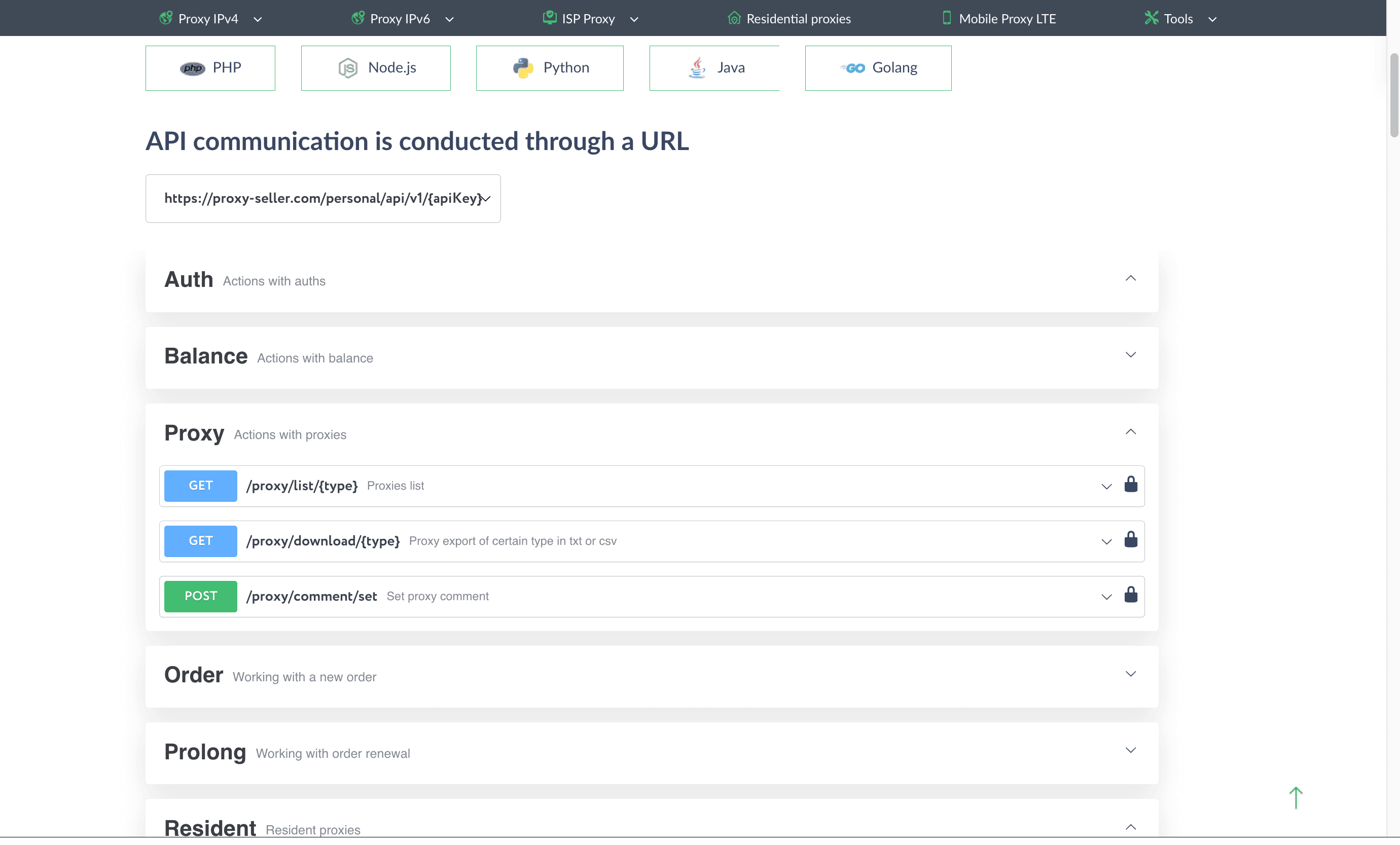
Supporting Tools
Proxy-Seller offers several online tools to help work with proxies. Among them there’s a proxy checker, open port scanner, and a lookup of IP-related information. There’re also two latency-related tools, one of which can ping a website and IP, and the other that shows the connection route.
Documentation
Proxy-Seller has an FAQ section that covers each product. It does a decent job answering the main questions.
There’s also the blog where you’ll find over 100 configuration guides for browsers, operating systems, and other software. If you prefer the video format, the provider has made some of the guides available on its YouTube channel. Overall, information wasn’t something that we found lacking.
Hands-On Support
Proxy-Seller’s customer supports works round the clock and can be contacted over multiple channels: live chat, Messenger, Skype, Telegram, and email. In addition, the provider offers the option of remote assistance for proxy setup.
I had issues with setting up residential proxies and decided to try out the live chat. An agent responded in less than a minute. At first I was given several solutions that were loosely related to my problem, without much troubleshooting. But we were able to reach the bottom of the problem relatively quickly.
Overall, I was satisfied with the customer service experience.
Conclusion
Overall, I had a positive experience with Proxy-Seller.
Its proxy networks are flexible in both location coverage and pricing. This is a big strength for individual users, as providers with similar feature variety usually cater to companies. Proxy-Seller is big enough to supply the latter, as well, though its user experience can get confusing and is probably too limited for enterprise needs.
Throughout the testing period, I had few issues with proxies themselves, while the customer service provided quick help when I needed it. The pricing doesn’t bite, too.
All in all, Proxy-Seller looks like a strong mid-range pick. Not perfect, and probably better for individual or small business use, but definitely a provider to be considered.
Proxy-Seller Alternatives

Decodo has a similar price, arguably better user experience, and stronger residential proxy network. But its datacenter and ISP proxies are less diverse, with more rigid pricing.

Bright Data is always a strong option, with even more flexibility and location coverage for all proxy networks. It costs way more for the same features, though, and has very strict policies.

IPRoyal is similar in many regards. Its datacenter and ISP proxies don’t need much commitment and cover nearly as many locations. The pricing is comparable, too.
Recommended for:
Individuals or small to medium businesses that need variety without the price tag.
Use the coupon PROXYWAY to get 15% off any purchase and 39% off residential proxies.

Use the coupon PROXYWAY to get 15% off any purchase and 39% off residential proxies.
